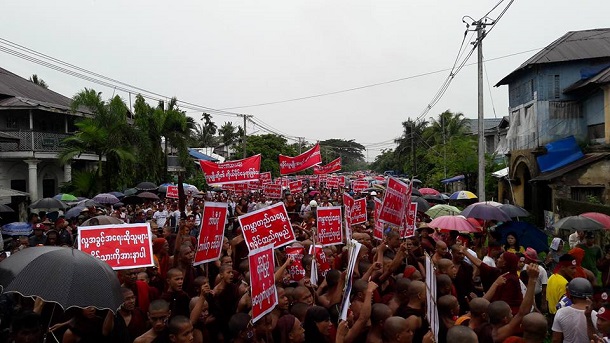RANGOON — Thousands of Buddhist residents of Arakan State took to the streets on Sunday to protest against the government’s new term for those who self-identify as Rohingya, the largely stateless Muslim minority in Arakan State.
The protests took place in 15 out of 17 townships of Arakan State. A delay in requesting permission from authorities prevented demonstrations from going ahead in Rathedaung and Gwa townships.
The demonstrations were sparked by a request made by Burma’s representative to the United Nations (UN) Human Rights Council on June 17: that the term “Muslim community in Arakan State” should be used instead of the contentious terms “Rohingya” or “Bengali,” so as to foster “harmony” and “mutual trust” between the Buddhist and Muslim communities in Arakan State.
The following week, Yanghee Lee, the UN’s special rapporteur on human rights in Burma, visited Arakan State and met with both Buddhist and Muslim communities. During her time in the country, the Ministry of Information officially instructed state-owned publications to use the terms “the Muslim Community in Arakan State” and “the Buddhist Community in Arakan State.”
In the Arakan State capital Sittwe on Sunday, thousands of people—including Buddhist monks—marched through the city center holding banners reading “Arakan State Belongs to the Arakanese,” and shouting slogans such as “Bengalis must be called Bengalis.”
Many in Burma insist on calling the Rohingya “Bengali,” to suggest they are illegal migrants from Bangladesh, and consider the “Rohingya” label an illegitimate claim to belonging in Burma as a distinct ethnic group.
Prior to the weekend protests, Arakanese nationalist groups from Sittwe last week sent an open letter—signed by about 500 residents and 70 Buddhist monks—to President Htin Kyaw and State Counselor Aung San Suu Kyi objecting to the government’s new terminology.
The letter was also delivered to Burma’s Commander-in-Chief Snr-Gen Min Aung Hlaing; the Upper and Lower House parliamentary speakers; the Union ministers of defense, of home affairs, of information, and of labor, immigrations and population; and the Arakan State government.

















